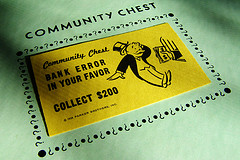 In a famous “community chest” card in the Monopoly board game, if there is a bank error in your favour, then you can collect $£€200. On the card, the lucky customer is pictured almost fainting in astonishment, as a teller presents a wad of notes. Sadly, as with the history of Monopoly, as told by Mary Pilon in her fascinating book The Monopolists: Obsession, Fury, and the Scandal Behind the World’s Favorite Board Game (2015) (Bloomsbury | Amazon), the reality is far more complicated. As I have said on this site, a bank error in your favour is not a gift from God; an overactive atm is not santa, and the scrooge bank will have to be repaid; and bank errors are not a licence to gamble.
In a famous “community chest” card in the Monopoly board game, if there is a bank error in your favour, then you can collect $£€200. On the card, the lucky customer is pictured almost fainting in astonishment, as a teller presents a wad of notes. Sadly, as with the history of Monopoly, as told by Mary Pilon in her fascinating book The Monopolists: Obsession, Fury, and the Scandal Behind the World’s Favorite Board Game (2015) (Bloomsbury | Amazon), the reality is far more complicated. As I have said on this site, a bank error in your favour is not a gift from God; an overactive atm is not santa, and the scrooge bank will have to be repaid; and bank errors are not a licence to gamble.
That last warning was in the context of “some technical issues” being experienced by Ulster Bank in June 2012, by which some “account balances … [were] not up to date” at ATMs. I specifically commented that any excess withdrawals in such circumstances would have to be repaid. And I warned that such withdrawals often amount to theft. It is not a surprise, then, to read today’s stories of a woman who stole more than €57,000 from various ATMs across Dublin on 22 June 2012 and today pleaded guilty pleaded guilty at Dublin Circuit Criminal Court to ten counts of theft from Ulster Bank.
As RTÉ reports:
Woman stole €57k from Ulster Bank during IT failure
Ulster Bank has issued criminal proceedings against a number of people who failed to pay back money withdrawn fraudulently while the bank was experiencing a software failure, a court has heard.
The details of the other investigations emerged during the sentencing of a care worker who stole more than €57,000 from various ATMs across Dublin. Titilayo Kilanko, 38, … told gardaí she used the money to pay for her father’s kidney transplant in Nigeria. … [She] admitted stealing a total of €57,708 by making 115 fraudulent withdrawals from ATMs …
See also Irish Independent | Irish Times | UTV Ireland. This was an IT glich, but the error could be much simpler (for example, higher denomination notes being dispensed, having been misloaded into the ATM), and the principles would still be the same. The erroneous overpayments can be recovered by the bank (whether on foot of the bank’s terms and conditions, or pursuant to a restitution claim to recover a mistaken payment), and so must be repaid by the customer. Worse, as the defendant in today’s case discovered, seeking and retaining the overpayments can amount to theft. Sadly, the community chest card is not a guide to real life – if there is a bank error in your favour, then you should return the $£€200 immediately.
Can a Bank benefit from a customer error e.g. customer lodges €1,000.00 but gives the bank €1,100.00 in error. Bank lodges €1,000 to my account and at the end of day is over by €100, they cannnot identify the customer and I don’t realise my mistake. Can the Bank keep that money and offset it against say a shortage of €120 later that week, or must the Bank hold it separate and if not reclaimed after a period, lodge it to an Unclaimed funds account and eventually to a Dormant funds account.
Hi Aidan.
This is an interesting hypothetical.
In principle, Bank cannot benefit from a customer error. Any recipient of a mistaken payment is unjustly enriched, and must make restitution of the amount of the mistaken payment. So, if a customer, intending to lodge €1,000, instead gives the bank €1,100 in error, then, in principle, the bank is unjustly enriched at the customer’s expense by the overpaid €100, and must make restitution in that amount.
However, it may be difficult to prove that the overpayment actually was mistaken. Moreover, in your hypothetical, the customer doesn’t realise the mistake, and the bank’s systems cannot identify the customer. So, although there may be a claim in principle, it is not available on your facts.
The claim is a personal one, so it only gives rise to a debt on the part of the bank to the customer. The customer doesn’t own the overpaid €100 in any sense. There is, therefore, no reason here why the bank must hold it separate. So the bank can deal with it as it chooses. For example, it can, as you say, offset it against a shortage elsewhere of €120 later that week.
Of course, it only takes a small change on any of the facts to change the analysis. But this seems to me to be the logical consequence of your hypothetical.
Finally, the disclaimer obviously applies.
Eoin.
The bank would also be in huge trouble for that. At any later point in time, the bank will get audited and it will be discovered that they have more (or less) money in their vault than on their balance sheet. Banks are subject to very strict compliance and security regulations which obviously would not have been met, hence rendering them unfit for business.